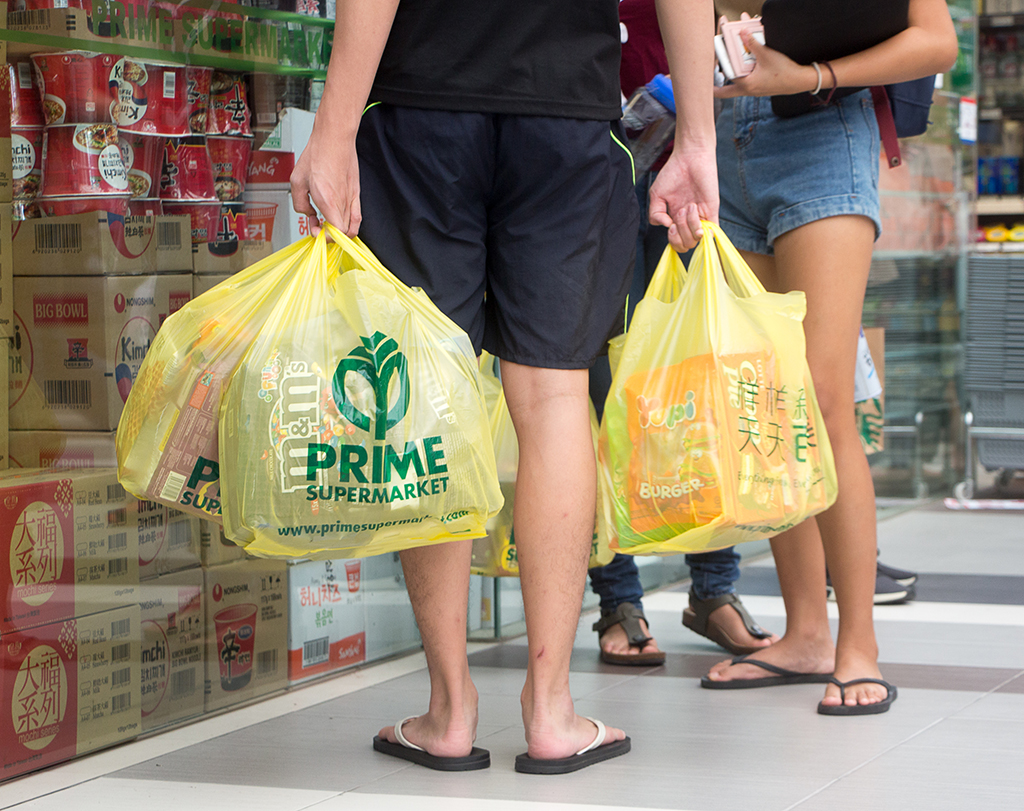More students say no to plastic bags after levy kicks in
15 Oct 2018
By Alan Yuen
 Prime Supermarket gave out 2,500 plastic bags a day before the levy was implemented.
Prime Supermarket gave out 2,500 plastic bags a day before the levy was implemented.
PHOTO: DEBBIE MICHELLE NG
Students are now taking fewer plastic bags after a $0.20 levy was implemented across campus on 1 Oct. Food outlet employees told the Nanyang Chronicle that as few as five per cent of customers have asked for plastic bags since the levy was implemented.
The levy, which applies at retail and food outlets, and at campus events, was announced during NTU President Subra Suresh’s State of the University address in August, and is part of a move to reduce plastic usage on campus.
Stalls which have started charging for plastic bag usage include Koufu, Each-A-Cup, Prime Supermarket and Giant Express.
The levy is estimated to save 10 million plastic bags yearly, according to The Straits Times.
Fewer bags requested
According to six retail and food outlet employees the Nanyang Chronicle spoke to, between 60 to 95 per cent of customers have stopped asking for plastic bags.
Branch manager of Prime Supermarket, Mr Raymond Beh, 53, said the supermarket used give out about 2,500 plastic bags a day. On 2 Oct, only 287 plastic bags were sold.
The supermarket also sold 30 reusable bags the day after the levy was implemented, twice as many as the 15 that are usually sold in a week, said another supervisor who declined to be named.
Food outlets have also experienced a decrease in plastic bag requests.
Ms Jean Teo, manager of NTU’s Subway outlet, told the Nanyang Chronicle that they now receive only 20 plastic bag requests for every 200 takeaway orders in a day, a 95 per cent drop from before, the 58-year-old added.
Most students the Nanyang Chronicle spoke to said they have stopped requesting for plastic bags to save money and prevent further wastage.
Even before the levy was implemented, Chong Wen Jun, 24, a third-year student from the School of Social Sciences, had already begun packing small purchases into his backpack.
“Most of the time, my purchases can fit into my hands or bag but there was a tendency to take a plastic bag because it was given by default,” he said.
“With the $0.20 charge, I’ll have to think twice before getting one,” said Chong, who now brings reusable bags to carry larger purchases that cannot fit into his backpack.
Leon Leo, 22, a second-year School of Computer Science and Engineering student, said he has also started to bring along a reusable bag when he shops for groceries at Giant to avoid paying the levy.
“(Even) if I buy groceries and forget to bring a bag, I will carry everything with my hands,” said Leo, who is doing a second degree at the Nanyang Business School.
But there are still students who feel the convenience of purchasing a plastic bag outweighs the cost.
Nicholas Tan, a final-year student from the School of Electrical and Electronic Engineering student, said he does not mind paying the extra $0.20.
“Unless it’s just an item or two, I would probably pay for a plastic bag,” the 24-year-old said.
“To me, 20 cents doesn’t make much of a difference. If it was 40 cents or even one dollar for a bag, I would start to take action.”


